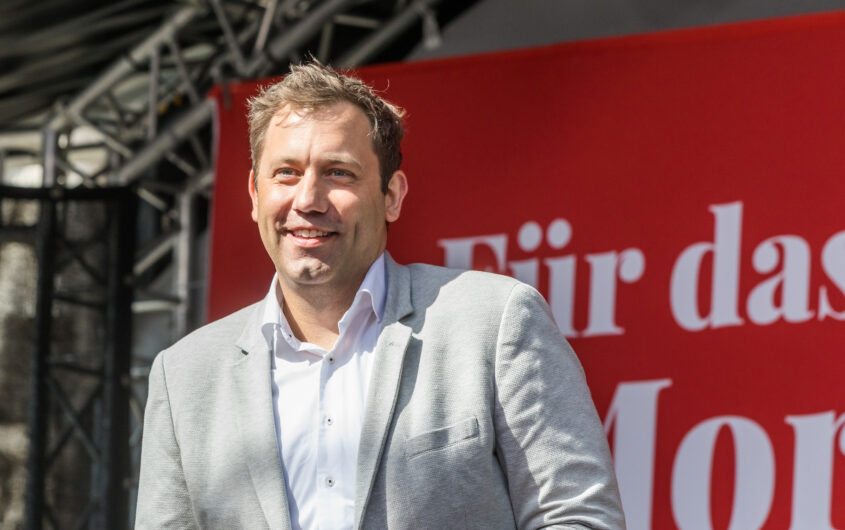
Raimond Spekking via Wikimedia Commons
AGI Profiles: Lars Klingbeil

Lucas Holloway
Halle Foundation/AGI Intern
Lucas Holloway is a Halle Foundation research intern at AGI in spring 2025. Originally from Savannah, Georgia, he a senior at Johns Hopkins University in Baltimore, Maryland, where he is pursuing a dual Bachelor of Arts in International Relations and Economics. In addition, Mr. Holloway spent a semester abroad in Berlin, Germany, last spring, gaining firsthand experience on the importance of U.S. strategic and socioeconomic ties with our European allies.
Before joining AGI, Mr. Holloway was a legislative intern for Congresswoman Debbie Wasserman Schultz on Capitol Hill, developing expertise in public policy work, constituent services, and the American legislative process. At Johns Hopkins, he was also president of the Hopkins Lecture Series, where he invited experts to speak to the Baltimore community about domestic and international issues.
Mr. Holloway’s research interests at AGI include German politics and elections, transatlantic diplomacy, and global economic trends.
Leader of the Social Democratic Party, Minister of Finance, and Vice Chancellor of Germany
In the aftermath of the 2025 German federal elections, both the Bundestag and German media were abuzz with speculation about who would lead the Social Democratic Party (SPD) after its historic defeat. Then-lead candidate, former German Chancellor Olaf Scholz, had pledged to step down from his prominent role within the party after taking responsibility for the SPD’s worst national result since 1887—finishing third with just 16.4 percent of the vote. This left Germany’s historically dominant center-left party grappling with a leadership vacuum at the top that it was desperate to fill during a moment of deep uncertainty for the party and Germany as a whole. Following a brief period of introspection (too brief, according to some within the SPD), co-chair Lars Klingbeil ultimately emerged as the choice to temporarily lead the party’s incoming Bundestag faction, effectively positioning him as the Social Democrats’ most powerful figure.
Since then, Klingbeil has solidified his top position within the SPD, having led coalition talks with the conservative Union parties (CDU/CSU) that culminated last month in a governing agreement placing him in the powerful roles of finance minister and vice chancellor. In these positions, Klingbeil has already assumed major responsibilities, including overseeing Germany’s military rearmament and working toward a potential tariff compromise with the United States. However, while now on center stage, Klingbeil’s rise to the top of German politics did not happen overnight but was achieved through skilled political maneuvering and pragmatism that have defined Klingbeil throughout his political career.
Early Life and Career
Born on February 23, 1976, in Soltau, Lower Saxony, in West Germany, Lars Klingbeil came from a quintessential SPD background, as the son of a career Bundeswehr soldier and a retail saleswoman. Klingbeil embraced politics at an early age, serving as a student representative at his Gymnasium (high school) in Münster, where he says he campaigned for a school “party bus” and organized demonstrations against neo-Nazis. In 1999, Klingbeil began studying political science, sociology, and history at Leibniz University Hannover, where he earned his master’s degree in 2004 after completing research and internship programs in the United States as a fellow for the Friedrich-Ebert-Stiftung (FES). It was during one such stay in the United States that Klingbeil’s life and political outlook were profoundly shaped: he was working in Manhattan on September 11, 2001, and witnessed the terrorist attacks firsthand. Although Klingbeil had previously been critical of the military and even abstained from the then-obligatory training in favor of community service, he later said that watching 9/11 prompted a period of soul-searching that sparked a deep interest in security policy and the Bundeswehr, marking a clear departure from Germany’s culture of pacifism.
Returning to Germany in 2001, Klingbeil worked for two years in the constituency office of then-German Chancellor Gerhard Schröder (from whom Klingbeil has since distanced himself over Schröder’s support of Russia), while also advancing through the ranks of the Münster city council and the Heide district council as a student. After graduating and briefly serving as Deputy Leader of the Jusos, the Social Democrats’ youth wing, Klingbeil entered national politics in 2005 when he was appointed to succeed former MP Jann-Peter Janssen, who had resigned amid a financial scandal. However, Klingbeil would only serve in this first stint for ten months, as he was voted out of office amidst the fall of the Schröder government during the 2005 German federal elections. Returning to local politics in Lower Saxony, Klingbeil once again stood for the Bundestag in 2009, where he failed to win as a direct candidate but would enter via the SPD state list. Since then, Klingbeil has remained a mainstay in Berlin, now representing Rotenburg I — Heidekreis, where he most recently won the direct mandate with 42.1 percent of the vote in 2025.
Rapid Rise within the SPD
Once in the Bundestag full-time, Klingbeil quickly established himself as an expert on military policy, earning a seat on the defense committee after his return to office in 2009. Sometimes breaking with his own parliamentary group, Klingbeil pushed for policies such as using automated drones to protect German soldiers, while also championing digitization efforts within the German military and the wider economy. In addition, he joined the self-described pragmatic and conservative wing of the SPD known as the Seeheimer Kreis in 2015—a group characterized by its pro-business attitudes and willingness to compromise with more right-leaning factions in the Bundestag.
Eventually, Klingbeil came to the attention of the SPD party leadership, which was desperately seeking more young faces to run the party after a disappointing electoral performance in 2017. Well-liked by both his political allies and opponents, Klingbeil (then only 39 years old) was seen as someone whose age and adaptability could symbolize the Social Democrats’ generational change and policy refocus. That year, he was nominated and confirmed with 70 percent of the vote as General Secretary of the SPD, a role he held for four years, during which he played a key part in managing the party’s successful 2021 election campaign and coalition talks. After the SPD’s victory in 2021, Klingbeil was elevated to party co-chair, where he served alongside Saskia Esken as the most senior political figure within the SPD under the oftentimes turbulent chancellorship of Olaf Scholz. During this period, Klingbeil reportedly had a mixed relationship with the former chancellor—publicly backing Scholz’s much-discussed Zeitenwende and immigration proposals, but privately urging him not to run again in late 2024 after it became clear the SPD was plummeting in the polls.
Recent (and Future) Consolidation of Power
Following the SPD’s historic election failure earlier this year, the party was left grappling with the question of how much it needed to overhaul its leadership as it stumbled into the 21st Bundestag. While the SPD had endured its worst political loss in over a century, it was still the preferred junior partner for the election winners, Friedrich Merz and the CDU/CSU, and therefore needed seasoned leaders to help steer the upcoming coalition negotiations. Acknowledging this, Klingbeil distanced himself from Scholz and declared on election night that there should be a “change of generation” before nominating himself as temporary leader of the Social Democrats’ parliamentary group because of his previous experience with coalition talks. Even though figures like Jusos leader Philipp Türmer—who labeled Klingbeil an “architect of failure”—voiced strong opposition to Klingbeil’s power grab and deflection of blame, his self-nomination was swiftly approved by the SPD parliamentary rank-and-file, with 85 percent voting in favor. Backed by his party, Klingbeil then took the lead in the Social Democrats’ negotiations with the CDU/CSU, emerging as a skillful representative for the SPD while building a close working relationship with Friedrich Merz. Klingbeil ultimately brokered a deal that delivered major concessions to the SPD—including control of seven ministries and a provisional pledge to implement a €15 minimum wage, among other proposals—while positioning himself to assume the influential positions of finance minister and vice chancellor.
Although the current coalition government was successfully inaugurated following a brief (yet historic) stumble by Merz to assume the chancellorship, it remains to be seen how effectively Klingbeil will navigate his newfound role as Germany’s finance minister over the coming years. Given his defense expertise and support for the Zeitenwende, whose military modernization efforts were recently supercharged by Germany’s landmark debt reform, some experts believe that Klingbeil will devote much of his attention to funding the country’s comprehensive rearmament. In doing so, Klingbeil will need to closely coordinate with the Ministry of Defense on issues such as increasing arms deliveries to Ukraine and compliance with EU fiscal rules—a task made easier by the continued tenure of fellow SPD colleague (and as the most popular politician in Germany, his potential chancellor candidate rival) Boris Pistorius as defense minister.
Others, however, point out that Klingbeil has limited experience in handling public finances and now faces the daunting task of overseeing Germany’s complex and often opaque financial system—one that has challenged even seasoned budgetary experts. Thus far, the finance minister has taken a centrist approach to boost budget savings, advocating for spending cuts and tax breaks in select areas (which will be finalized in late June) while simultaneously expanding infrastructure investment and economic modernization through a €500 billion fund also included in the debt reform package. Such moves reflect a concentrated effort by Klingbeil to moderate the Social Democrats’ rhetoric following their bruising election loss, presenting a more pragmatic image for the party as he works to reverse over two years of economic decline in Germany and manage escalating trade tensions with the United States.
Whether Klingbeil rises to the challenge of his new roles could have far-reaching consequences for Germany’s future at a time when President Donald Trump is rapidly redefining the transatlantic alliance and the far-right Alternative für Deutschland (AfD) grows stronger by the day. Yet, if Klingbeil proves successful, he is well-positioned to reap the political rewards, with a potential run for the chancellery in the cards sometime in the not-so-distant future.








